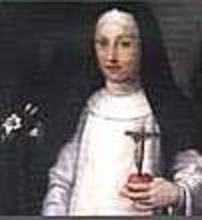
Claudia Sessa (c. 1570 – c. 1617/19) was an Italian composer and singer/instrumentalist. She was born into the (de) Sessa family, a patrician clan of the Milanese aristocracy. A nun at the convent of S. Maria Annunciata, she composed two sacred works published in 1613.[1] The dates of her birth and death are uncertain.[2] Gerolamo Borsieri wrote a long and glowing description of her (quoted in "Women Composers: Music Through the Ages"),[3] including that she sang and accompanied herself so well "that there was not a singer who could equal her" and that nobility in Parma and Mantua liked her singing more than "Claudio Monteverdi [or] any other musician in the recitative style..."[3]
- ^ "Claudia Sessa". Retrieved 7 November 2010.
- ^ Sadie, Julie Anne; Samuel, Rhian (1994). The Norton/Grove dictionary of women composers. W. W. Norton & Company. ISBN 9780393034875. Retrieved 12 November 2010.
- ^ a b Smith, Candace (1996). Schleifer, Martha Furman; Glickman, Sylvia (eds.). Women Composers: Music Through the Ages. New York: G.K. Hill. pp. 345–6.